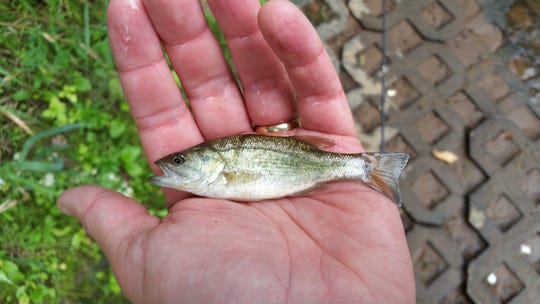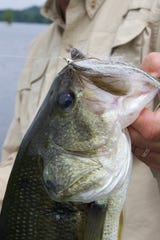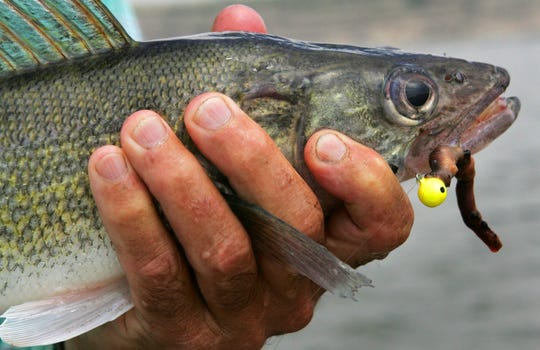Global warming could mean fewer fish for sport fishing, more die-offs across US
Jul 09, 2019 09:34PM ● By Editor
Andrew Rypel, a professor of wildlife, fish and conservation biology at the University of California, Davis with a walleye he caught in Sanford Lake, Wis. Photo: Courtesy Andrew Rypel
By Elizabeth Weise, USA TODAY -July 9, 2019
Global warming is putting lake fish in hot water, with worrisome possibilities for many species, as well as the nation's fishermen and the $115 billion sport fishing industry that employs as many as 820,000 people.
A study published in the journal Nature Climate Science Monday found at least a 100 fish die-offs in Wisconsin between 2004 and 2014 were strongly linked with warmer summer temperatures fueled by climate change. Already, some species, such as walleyes and cisco, are experiencing declines because of warming water temperatures.
And it's only going to get worse if humans don't act. The die-offs in Wisconsin’s lakes are expected to double by mid-century and quadruple by 2100 and there could be significantly more fish die-offs as global temperatures increase.
The concern extends far beyond Wisconsin. Scientists and sport fishing officials across the United States are worried that global warming could have grave consequences for local ecosystems, as well as sport fishing industries. That includes everything from marinas, fishing guides, tackle shops, restaurants, hotels and fishing gear manufacturers, according to the American Sportfishing Association.
“It supports 22,000 jobs in our state. We’re talking about an effect that has a direct economic impact on a state with a big outdoor tourism economy,” said Andrew Rypel, a fish biologist at the University of California, Davis and an author on the paper.
Wisconsin is a bellwether state because it's the third most popular destination for anglers to travel to, according to the sport fishing association, after Florida and Michigan. Sport fishing is a $2.3 billion industry in Wisconsin.
The Wisconsin findings are based on a particularly rich dataset that's been collected by the state over many years. It was analyzed by a group of biologists, ecologists and fisheries scientists. They found that warmer temperatures could mean trouble for species common in these lakes, such as bluegill, walleye, largemouth bass and northern pike.
The researchers' findings match the state's, said Alexander Latzka, a fisheries biologist with Wisconsin's Department of Natural Resources.
“There’s no question that fisheries are changing relatively rapidly,” he said.
The study's findings let researchers connect the dots between warming lakes and the occurrence of damaging fish die-offs, Rypel said.
“What we’re really documenting here is how climate change is going to affect the composition of ecosystems, how populations can go away and how species can die,” Rypel said.

A bluegill caught at Peterson Lake in Burnett County, Wis. Photo: Andrew Rypel
Higher temperatures mean warmer water
The researchers looked at a database of 502 freshwater fish die-offs in Wisconsin lakes between 2004and 2014 and compared them with local water temperatures. They initially thought they’d see a decrease in wintertime fish kills because as snow and ice cover diminishes, more sunlight could get through to the algae in lakes that are the basis for such ecosystems.
“But science often surprises you,” said Rypel.
They instead found that summertime fish kills were increasing.
The median surface temperature during die-offs was 78.6 degrees Fahrenheit, 12% higher than during periods when summer fishkills didn't occur.
And the number of fish die-offs used in the study is actually probably an underestimate, Latzka said.
“We can’t staff our 15,000 lakes, so it’s really dependent on the public reporting them,” he said.
Of the popular sport fish in the area, walleye, a cool-water species, died at higher rates than largemouth bass, which is a warmer water species.
In fact, a report by the U.S. Geological Survey released in 2016 found that rising temperatures could mean that by the end of the century many lakes in Wisconsin will be less suitable for walleye and more suitable for largemouth bass.

Juvenile smallmouth bass. Photo: Andrew Rypel
No fish population is immune
Of course, fish can be restocked each year, so even lakes that no longer can support a naturally reproducing population of fish can be available to fishermen. But it will cost state natural resource departments – and ultimately anglers – more.
Raising fish in hatcheries is expensive. A 4-inch walleye costs $2.02 to stock, a 12-inch fish can cost $15.00. For smallmouth bass, a 4-inch fish can cost $4.63 while a 6-inch fish is $7.94, said Rob Southwick, a sport fishing industry data and statistics expert who works with the American Sportfishing Association.
Whatever the reason for the shift, stocking costs are always a concern, he said.
“State agencies are not necessarily flush with funds. They might not be able to build new hatcheries or hire more staff,” Southwick said.
Other species are also a concern. In fact, “there was really no species that live in these lakes that didn’t show up in the database at least once. So no fish population is immune from experiencing these die-offs,” said Samuel Fey, a professor of biology at Reed College in Portland, Oregon, who was co-author on the paper.
One is cisco, sometimes called lake herring. While not as popular a sport fish, it’s vital for lake ecosystems because it in turn is eaten by predators such lake trout, northern pike, walleyes and salmon.
Cold-water species like cisco were involved in 6% of the die-offs analyzed by the researchers. In some southern lakes in Wisconsin, they've largely disappeared.
Wisconsin is actively trying to build resilience to warming in its lakes. One way of doing that is taking down trees and dropping them into lakes, to provide woody habitats that give fish shade and refuge, Lantza said.
“We don’t have much control over the water temperature going up, but we can create habitats that might help in light of that change,” Fey said.

A largemouth bass. Photo: Gary Garth
Across the U.S., water is getting warmer
This isn’t just happening in lakes. Wisconsin is currently tracking temperature changes to trout and smallmouth bass in streams, which could affect other fish populations, Latzka said.
It's also occurring in other states.
Research at the University of Minnesota Duluth’s Large Lakes Observatory found that Lake Superior surface water temperatures increased 4.5 degrees between 1979 and 2006.
This has extended the days with optimal water temperatures for some species but decreased them for others. Researchers at the University of Wisconsin found that Chinook salmon and walleye had more days where the temperatures were best for them, while siscowet lake trout had fewer days per year in its preferred temperature range. The right temperature can mean fish grow and reproduce better than they do when it's too hot or too cold for them.
Over time, say the researchers, some species won’t do as well as lakes’ ecological systems recondition to favor species that are more resilient to warmer temperatures.
The shift is already occurring. An increasing number of largemouth bass fishing tournaments are occurring in places like Minnesota and Wisconsin in areas that haven’t historically been prime bass fishing, said Rypel, who grew up fishing in Wisconsin.
“There’s a lake in Minnesota called Mille Lacs, which has historically been regarded as one of the best walleye fisheries in the country. It now has this booming largemouth bass population and it’s the site of some big tournaments,” he said.
Mille Lacs, Ryple said, “is a poster child for the future.”

A walleye caught in Grayrocks Reservoir near Wheatland, Wyo. Photo: Shauna Stephenson, AP
To read the original article and see related reporting, follow this link to the USA Today website.https://www.usatoday.com/story/news/nation/2019/07/09/global-warming-killing-fish-hurting-sportfishi...

